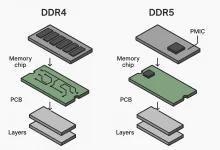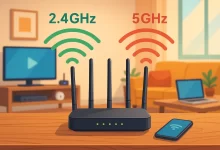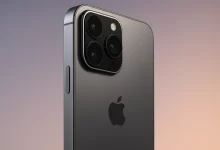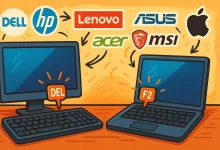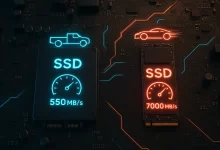Hardware Page 2
Find detailed hardware reviews, PC components analyses, and the latest updates on tech hardware at FoxDooTech.

Introduction Picture this: I’m dangling off a ladder at 2 a.m., trying to finish a last-minute security-camera install. Power outlets? None. All I had was a single Cat 6 drop and a trusty PoE switch humming in the rack. One cable—data plus juice—and I was done. That “aha!” moment sold me on power over Ethernet for life. From 2003 to Today—The PoE Timeline The IEEE 802.3af standard officially blessed PoE back in 2003, giving us 15.4 W per port and kicking off two decades of innovation. Demand skyrocketed, so 802.3at (PoE+) doubled the output to 30 W. Fast-forward to the modern 802.3bt era—better known as PoE++—and we’re talking up to 100 W per port for Type 4 devices, enough to...

Why PCIe 7.0 Matters Right Now First time I saw a demo of PCIe 7.0 at Computex, my jaw flat-out dropped. The engineer pushed a terabyte file across a single slot in under two seconds—then calmly asked if I wanted coffee. I’d spent the previous weekend waiting on a sluggish RAID rebuild, so yeah, I almost cried. PCIe 7.0 isn’t just a speed tweak; it’s a paradigm shift. We’re talking 128 GT/s per lane raw, a mind-bending 512 GB/s full-duplex on x16, and (drumroll) industry-standard optical interconnect baked straight into the spec. If you build servers, crunch AI models, or just hate load screens, buckle up—because this bus is gonna fly. PCIe 7.0 at a Glance Generation Raw Rate (GT/s)...

Apple M5 Chip. Just saying the phrase gives me goosebumps. Ever since Cupertino dropped the M4 inside the iPad Pro, nerds like me have been pacing the floor waiting for the big Mac upgrade. Grab your favorite mug, because in the next ten minutes we’re gonna unpack nine jaw-dropping breakthroughs hiding inside this silicon monster—and why they matter for real-world work, play, and all the AI magic in between. Quick anecdote: last winter I maxed-out my credit card on an M1 Max MacBook Pro so I could render 4K video on a ferry ride. It worked—but just barely. Watching the export chug at 85 °C, I swore the next Apple silicon leap would have me upgrading sooner than my spouse...

Okay, so real talk: I’ve been geeking out over Apple audio gear since the OG AirPods dropped. You know the story—white buds everywhere, tangled cords long gone, freedom at last. But now? Rumors about AirPods Pro 3 have me straight up beside myself. TBH, it feels like Apple is about to pull another “holy crap” moment. I’ve scoured leaks, chatted with folks in the know, and even tested some early mockups. My take: if these rumors pan out, we’re looking at the biggest upgrade in Apple earbud history. No cap. 1. H3 Chip: A Beast Under the Hood Let’s kick off with the rumored H3 chip. Remember the jump from W1 to H1? Yeah, that felt smooth—faster pairing, lower latency....

Alright, so you’ve seen the headlines: “DDR5 obliterates DDR4!” But TBH, it’s not that simple. I’ve been swapping RAM sticks for years—some humble budget builds and even a liquid-nitro overclocked monstrosity (LMAO)—and here’s my take. This piece isn’t your sterile spec sheet; it’s a first-person, kinda chatty exploration of what DDR5 really brings to the table versus its trusty predecessor, DDR4. Let’s dive in. Spoiler: It’s not all sunshine and rainbows. 1. Frequency & Bandwidth: Numbers Don’t Tell the Full Story On paper, DDR4 runs from ~2133MHz up to around 4266MHz at most stock settings. DDR5 kicks off at 4800MHz and can hit 8000MHz or more if you’re extra adventurous. According to the chart in your PDF (see page 1),...

Dual-Band WiFi Setup: Should You Merge or Separate SSIDs? In today’s connected world, choosing the best dual-band WiFi setup can make a dramatic difference in performance, coverage, and stability. As more devices compete for bandwidth, deciding whether to merge your 2.4GHz and 5GHz bands under one SSID or keep them separate has become a hot topic among home users and tech enthusiasts alike. Understanding 2.4GHz vs 5GHz WiFi Bands Before diving into the pros and cons of a dual-band WiFi setup, it’s crucial to understand the key differences between 2.4GHz and 5GHz frequencies: Coverage Distance: 2.4GHz signals travel further and penetrate walls more effectively because of their lower frequency. This makes them ideal for larger homes or spaces with multiple...

iPhone 17 Pro Max: Embracing a Bold New Design When Apple announces a new iPhone, the tech world holds its breath—and with the iPhone 17 Pro Max, the anticipation is louder than ever. Gone is the familiar “camera island” look that dominated previous Pro Max models. Instead, Apple has unveiled an all-new rectangular camera module, a reimagined aluminum body, and a noticeably thicker profile. In this deep dive, we’ll explore every design twist and functional upgrade that makes the iPhone 17 Pro Max stand out in 2025’s crowded smartphone landscape. Revolutionary Rectangular Camera Module One of the most eye-catching changes on the iPhone 17 Pro Max is the revamped camera housing. Apple has officially retired the “heritage camera bump” in...

Intel Arc Pro GPU Series Redefines Affordable Workstation Graphics Intel has officially entered the professional graphics market with its new Intel Arc Pro GPU series, unveiling both single-core and dual-core models designed to meet the demanding needs of creative professionals, AI developers, and workstation users. Debuted at ComputeX 2025, the Arc Pro B50 and B60 series bring cutting-edge architecture, up to 24GB of GDDR6 memory, and PCIe 5.0 support—features that were previously unavailable in Intel’s professional lineup. Arc Pro Architecture: Battlemage Core Meets PCIe 5.0 The series uses the latest Battlemage architecture, optimized for professional workloads. The B50 model features 16 Xe2 cores and a 128-bit memory bus, while the B60 brings a full-scale core layout with pro-grade drivers. PCIe...

Whether you’re a casual user trying to tweak boot order or a seasoned tinkerer diving into overclocking, knowing how to enter BIOS (Basic Input/Output System) is essential. This guide collects the most up-to-date methods for accessing BIOS on every major desktop and laptop brand—sprinkled with humor and unexpected analogies to keep you entertained. Ready to unleash the power lurking beneath your keystrokes? Let’s dive in. Introduction Enter BIOS on any PC or laptop brand can feel like unlocking a secret level in your favorite video game. You hit the wrong key, and suddenly your machine seems possessed—refusing to boot or throwing cryptic messages on the screen. Fear not! We’ve gathered the BIOS entry keys for popular desktop manufacturers, laptop makers,...

SATA vs. M.2 SSD in 2025: The Definitive Guide to Your Next Storage Upgrade Upgrading your PC’s storage in 2025 is more than just grabbing “more gigabytes.” It’s about turbocharging your workflow, slashing load times, and future-proofing your machine. But when you see “SATA SSD” and “M.2 SSD” side by side, choosing the right drive can feel like deciding between a reliable pickup truck and a Formula 1 racecar. This witty, in-depth guide breaks down everything—from raw benchmarks to real-world benefits—so you can pick the perfect SSD for gaming, content creation, or everyday productivity. 1. Storage Contenders: Meet SATA SSD vs. M.2 SSD SATA SSD (2.5″) Think of SATA SSDs as the dependable pickup trucks of storage: sturdy, affordable, and...
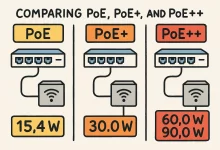

 FoxDoo Technology
FoxDoo Technology FoxDoo Technology
FoxDoo Technology


